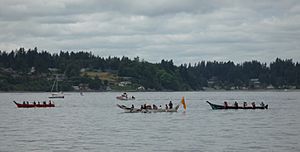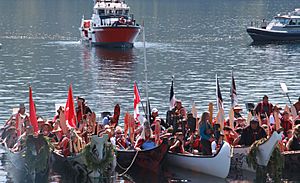Tribal Canoe Journeys facts for kids
The Intertribal Canoe Journey is a special event for the Indigenous peoples of the Pacific Northwest Coast. It's often called the Canoe Journey or Tribal Journeys. People also refer to it by its destination, like "Paddle to Muckleshoot."
This yearly event brings together canoe cultures from Indigenous Nations. These nations are from the coasts of Alaska, British Columbia, Oregon, and Washington. The first journey happened in 1989. It was part of Washington's 100th birthday celebration. Since then, people from other Pacific Rim canoe cultures have joined. These include Ainu, Hawai'ian, and Maori people. The Canoe Journey started after many years when Indigenous cultures faced challenges from governments. It helped bring back traditional ways of traveling on water. It also helped revive canoe carving, sharing cultural customs, and teaching young people. The Canoe Journeys for 2020 and 2021 were canceled because of the COVID-19 pandemic.
Many families and teams travel in canoes. These canoes often have art and names that show where they come from. Participants wear traditional clothing for celebrations. During these events, they share songs, dances, and gifts. Some canoes are made from cedar trees. Others use newer methods and materials. Canoe families visit different Native Nations on their way to the final host destination. This host nation changes every year.
Hosting the Canoe Journey is a big job for any host nation. The host nation feeds all guests breakfast and dinner. They also provide places for camping, eating, and cultural events. They give gifts to their guests and to the next year's host. Hosting the Canoe Journey can cost a lot of money.
After hosting in 2007, the Lummi Nation gave a special story pole to the Quw'utsun First Nation. This pole had a canoe on top. In 2013, the Quinault Nation hosted. They gave several hand-carved cedar canoes to special guests. The Swinomish Tribe built a waterfront park for their 2011 hosting. It had three covered areas that looked like woven cedar hats.
In 2011, Governor Christine Gregoire helped paddle a canoe with Swinomish Chairman Brian Cladoosby. In 2012, State House Speaker Pro Tem Jeff Morris helped paddle the Samish Nation's canoe. He is Tsimshian and had a Samish grandfather.
Contents
The History of Canoe Journeys
Canoes are very important to the cultures of the Northwest Coast. They were once almost gone. But the Canoe Journey helped bring them back.
The Canoe Journey is a very important cultural experience for everyone involved. The first modern Canoe Journey was in 1989. It was organized by Emmett Oliver, a Quinault educator. He wanted to make sure Indigenous peoples were part of the state's centennial celebration. This event was called the "Paddle to Seattle." That year, the state and Indigenous governments signed an agreement. It recognized the independence of Indigenous nations. Fifteen Native Nations joined the Paddle to Seattle. Now, more than 100 canoes take part.
Each year, a different Native Nation hosts the event. They provide food and lodging for the canoe paddlers and their support teams. These visitors come from Alaska, British Columbia, Washington, and Oregon. Depending on how far a team is traveling, the canoe trip can take up to a month. When they arrive, visiting canoe families formally ask the hosts for permission to land. They sometimes speak in their Native languages. A potlatch is then celebrated. This is a sharing of songs, dances, and gifts that lasts for days. The Canoe Journey is a family-friendly event.
In 2009, the Suquamish Tribe hosted the 20th anniversary Canoe Journey. They used their new House of Awakened Culture. More than 6,000 guests and 84 canoes arrived on Suquamish's shores.
On February 6, 2024, the Ahousaht chiefs and council announced they could not host the Canoe Journey. They said the event had grown too big for their small community. They also felt they had not been properly asked before the invitation was made.
Why Canoes Were Important
Many Indigenous peoples in North America used waterways to travel. They traveled for trade, hunting, gathering resources, and for ceremonies. They also visited relatives. These waterways were like important roads for them. That's why they are often called ancestral marine highways.
There were three main types of canoes built in North America: dugout, bark, and plank canoes. The ways they were designed and built changed by region. Their sizes also varied depending on what they were used for. In the Pacific Northwest, you could often tell where a canoe came from by its shape, name, and decorations.
Impact of the COVID-19 Pandemic
Chief Mike Wyse of the Snuneymuxw First Nation in British Columbia announced that Tribal Journeys 2020 was postponed. This was because of the COVID-19 pandemic. His nation was supposed to host that year. It was the first time since 1993 that the event did not happen.
The Tla'amin Nation was the planned destination for 2021. On October 30, 2020, they announced the Canoe Journey would be postponed again. This was due to the ongoing risks from the pandemic. Tla'amin spokesman Hegus John Hackett announced the postponement. He promised the Tla'amin Nation would host a future event.
Recent Canoe Journeys
- 1989: Paddle to Seattle, part of the Washington State Centennial.
- 2019: Paddle to Lummi. Host: Lummi Nation
- 2020: Paddle to Snuneymuxw. Host: Snuneymuxw First Nation. Canceled due to COVID-19 pandemic.
- 2021: Paddle to Tla'amin. Host: Tla'amin First Nation. Canceled due to COVID-19 pandemic.
- 2022: Smaller journeys took place in San Juan Islands, WA, and Kettle Falls, WA.
- 2023: Paddle to Muckleshoot. Host: Muckleshoot Tribe
- 2024: Power Paddle to Puyallup. Host: Puyallup Tribe
- 2025: Paddle to Elwha. Host: Elwha Klallam Tribe
 | Georgia Louise Harris Brown |
 | Julian Abele |
 | Norma Merrick Sklarek |
 | William Sidney Pittman |



